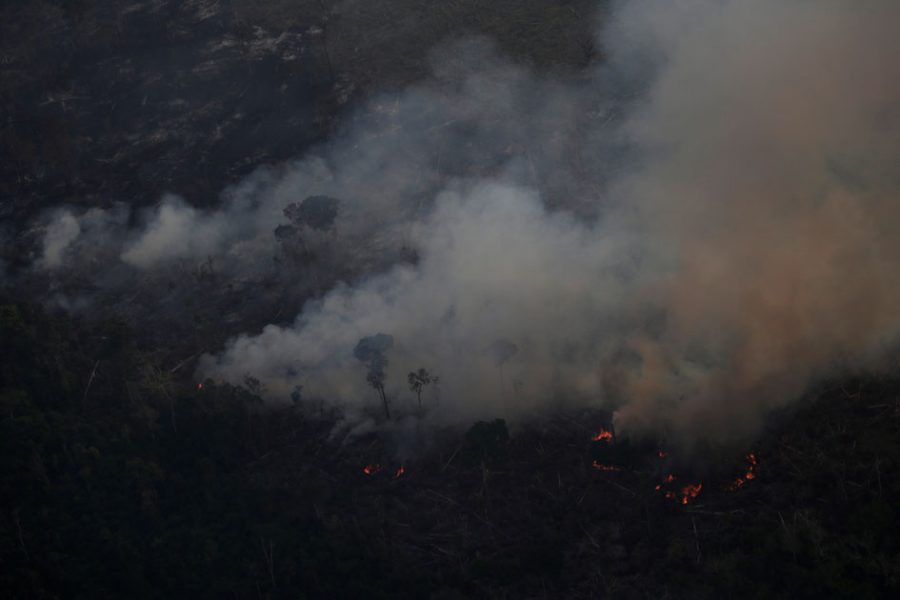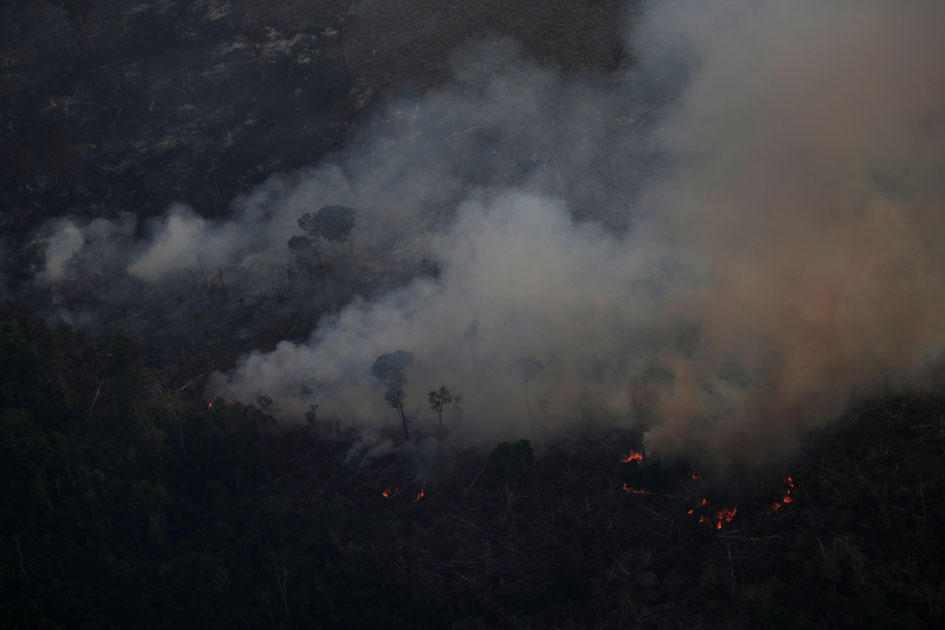
Brazil’s Bolsonaro May Send Army to Fight Amazon Fires After Global Pressure
BRASILIA – Brazil’s President Jair Bolsonaro said on Friday he may mobilize the army to help combat fires sweeping through the Amazon rainforest, as international condemnation and pressure mounted for tough action to quell the unfolding crisis. Having first dismissed the fires as natural, then blaming non-governmental organizations without evidence for lighting them, Bolsonaro struck […]

BRASILIA – Brazil’s President Jair Bolsonaro said on Friday he may mobilize the army to help combat fires sweeping through the Amazon rainforest, as international condemnation and pressure mounted for tough action to quell the unfolding crisis.














Having first dismissed the fires as natural, then blaming non-governmental organizations without evidence for lighting them, Bolsonaro struck a more serious note on Friday, saying he would summon top cabinet members to tailor a response.
Asked by reporters in Brasilia if he would send in the army, he said: “That is the expectation.”
Edson Leal Pujol, head of Brazil’s armed forces, said his soldiers were ready to defend the Amazon, though his words also appeared to refer to threats other than the fires.
“To the unwary who insist on safeguarding the purposes of the Brazilian Amazon, make no mistake, soldiers will always be alert and vigilant, ready to defend and repel any kind of threat,” he said at an event in Brasilia.
Forest fires in the Brazilian Amazon, which accounts for more than half of the world’s largest rainforest, have surged 83% this year, according to government data, destroying vast swathes of a vital bulwark against global climate change.
Although fires are a regular and natural occurrence during the dry season at this time of year, environmentalists blamed the sharp rise on farmers setting the forest alight to clear land for pasture.
Farmers may have had at least tacit encouragement from the firebrand right-wing president, who took power in January.
Bolsonaro has repeatedly said he believes Brazil should open up the Amazon to business interests, allowing mining, agricultural and logging companies to exploit its natural resources.
On Thursday, Bolsonaro admitted for the first time that farmers may be behind some of the fires.

The president is set to meet with a team that includes the defense and environment ministers and the foreign minister at 3 p.m. local time (19h00 SA time).
As the fires burned, foreign pressure continued to grow. Several hundred activists protested outside the Brazilian embassies in Paris and London on Friday.
The leaders of Britain, France and Germany added their voices to an international chorus of concern, with President Emmanuel Macron’s office accusing Bolsonaro of lying when he played down concerns over climate change at the G20 summit in June.
Alexandre Antonelli, director of science at Britain’s Kew Royal Botanic Gardens, urged that import sanctions be imposed on Brazil because of the fires.

“Immediate action is necessary to extinguish the current fires and prevent future ones,” the Brazilian scientist said.
On Thursday, Bolsonaro responded angrily to what he saw as foreign interference.
“These countries that send money here, they don’t send it out of charity. … They send it with the aim of interfering with our sovereignty,” he said.
Exclusive: As Amazon fires rage, Brazil tells diplomats to fix image
Stung by the global outcry over deforestation and wildfires in the Amazon rainforest, Brazil has launched a diplomatic offensive to persuade the international community of its environmental credentials.
President Jair Bolsonaro’s administration has distributed a 12-page circular to its foreign embassies, outlining data and statistics that diplomats are meant to cite to defend the government’s position on the crisis.
The circular, reviewed by Reuters and reported here for the first time, attempts to address 59 areas where Brazil has come under fire, by citing various policies and data.
The document attempts to rebut criticism of Brazil’s environmental record, but ignores some of President Jair Bolsonaro’s more controversial policies.
It states, for example, that deforestation peaked in the mid-1990s and was reduced by 72% between 2004 and 2018.
It neglects to mention that deforestation has been rising steadily again since 2012, due partially to the struggling Brazilian economy and budget cuts that resulted in less environmental enforcement.
This year, preliminary data suggests that deforestation in Brazil’s Amazon has surged 67% through July compared to the same period last year. The number of fires has surged 83% this year.
“It is important to keep in mind that in recent decades, Brazil has been able to twin agricultural production with conservation,” the document says.
“More than 60% of Brazil’s territory (of the Amazon) is covered by natural vegetation, with agricultural activities limited to about 30% of the territory.”
It does not say, however, that Bolsonaro has repeatedly said he believes Brazil has too much protected land and that it should be opened up to farming and mining.
(Reporting by Lisandra Paraguassu in Brasilia, Eduardo Simoes in Sao Paulo, additional reporting by William James in London and Marine Pennetier in Paris; Writing by Stephen Eisenhammer and Jamie McGeever; Editing by Bernadette Baum)
